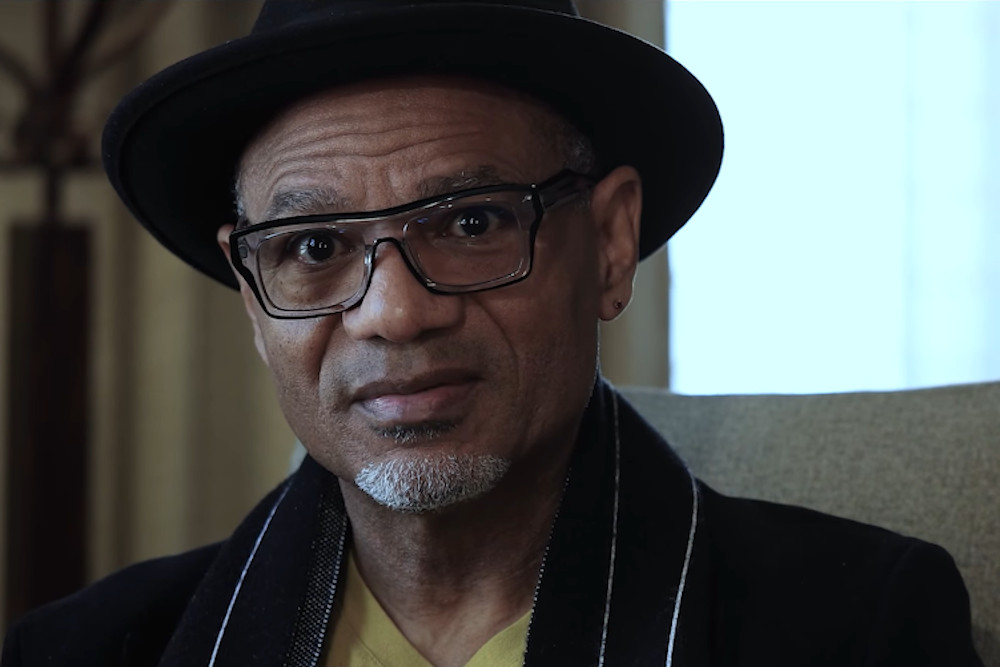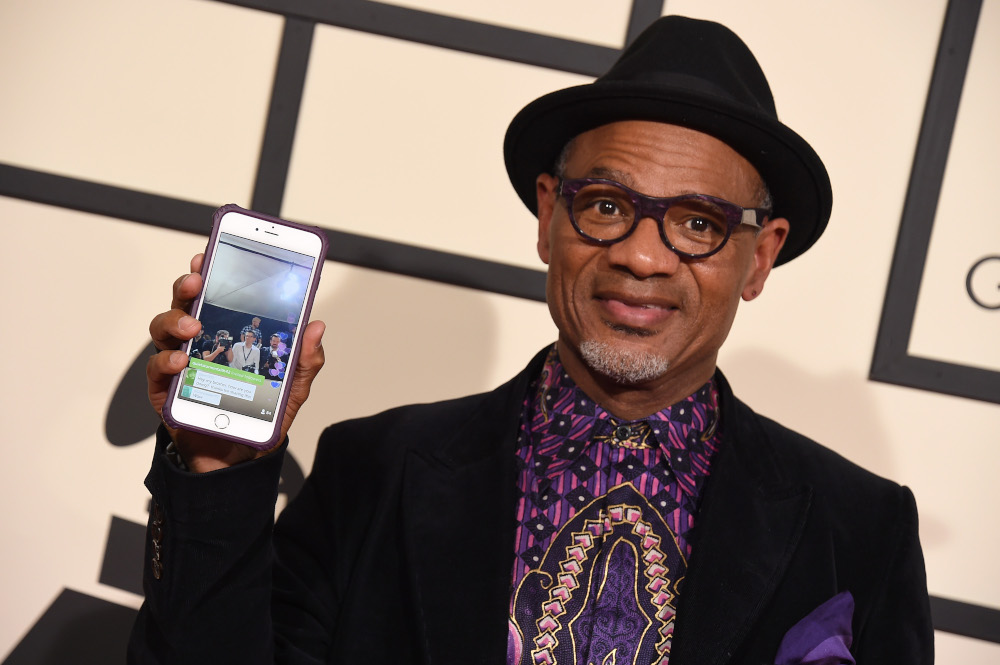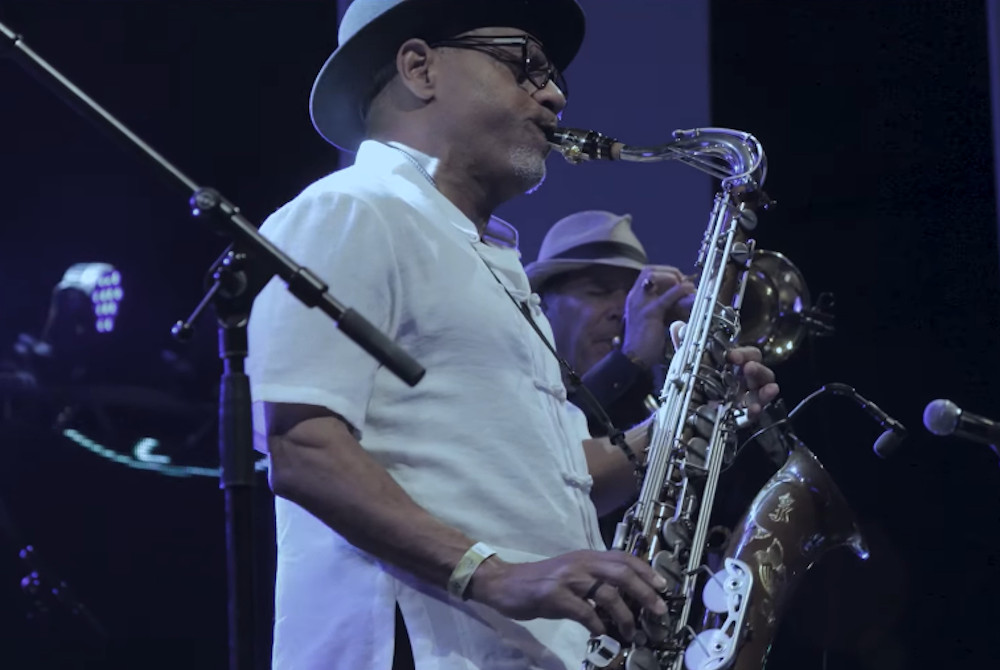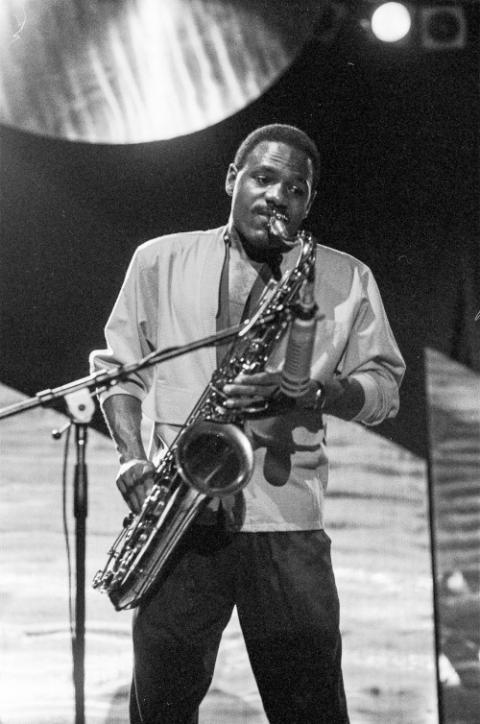
Kirk Whalum appears in the documentary "Humanité, the Beloved Community." (NCR screenshot/YouTube)
Kirk Whalum is a multi-Grammy Award-nominated saxophonist and composer whose work has spanned multiple genres, expressions, and platforms. He has to his credit the "most listened to" sax solo in history, and the Memphis native has nearly four decades of professional music under his belt. He is also perhaps the face of sacred jazz, having produced four critically acclaimed live albums featuring gospel music in the indigenous Black musical idiom.
More recently, his faith journey led him to the Catholic Church, an almost unheard-of turn for an American gospel music artist. Whalum sat down recently with Black Catholic Messenger to discuss this culminating moment, his musical inspirations, and his relationship with a certain African-American saint-to-be who also happens to be his kin. This interview has been edited for length and clarity.
Nate Tinner-Williams: Perhaps this is saying too much, but I think you may be best known for your saxophone solo on Whitney Houston's "I Will Always Love You" track from "The Bodyguard" soundtrack in 1992. On top of that, you've collaborated with some of the biggest names in pop, jazz, gospel, R&B, all over the place. I'm wondering: How do you see yourself in the big picture of popular music?
Kirk Whalum: Thank you. Well, I will say that the "I Will Always Love You" solo is definitely like a calling card. It's not something I asked for, but it has definitely materialized that way. Years ago, Whitney said something to us that stuck out in my mind: "Use my name if it'll help, but it ain't gonna always help." And, you know, I have found that to be true. Obviously, most of the time it helps and I think to define what she was doing was giving us permission — once she transitions — to say this is what I did with arguably the greatest pop singer ever.
That experience was definitive for me, you know. Just in the touring part of it, I became for her a sort of ad hoc chaplain. Her nickname for me was "Bishop." And that had to do with the fact that she knew where I was coming from, from the very beginning: loving Jesus — who she loved.
Advertisement
Amen.
When it was time for prayer or whatever, she looked to me. That was throughout the time — I mean, there was probably only a month that passed on the front end where I wasn't in that capacity for her and for the band. I even did Bible studies for them. She was able to attend a few times, but not many. They kept her running around, which is a part of the overall story of what ultimately happened to her, right?
Yeah.
And yes, you're right that the work that I was doing before I started working for her, in the area of jazz trying to help be a band leader there in the Houston area — I'm from Memphis originally — that work continued afterward. Sometimes my band opened some shows for her. But the work that I love and aspired to all along was to be a manifestation of Christ in this area of jazz. Not just representing God.
It's similar to the Eucharist — and I use that comparison respectfully. In Catholicism, transubstantiation is about the actual manifestation of God in the elements. I heard that concept early on in my development in Christianity and I kind of thought, "Ehh, I don't know about that," but now I definitely see a comparison there in terms of the space that I desire to inhabit in this earth realm. In my music, I want to manifest God. I want God to play, like God shows up in the music, in a way. If I'm just thinking about God or kind of hope God [is present], that's one thing but man, when God plays, everybody listens.
So on that topic: Your best-known work to me, actually, before I knew anything about your involvement in "I Will Always Love You," was actually your series of albums, "The Gospel According to Jazz." I believe those albums were playing at my house growing up.
Mmm.
My dad loved to play smooth jazz. So I'm curious where you got the inspiration to combine jazz and gospel.
It's interesting you ask that. I'm working on a piece now for a TEDx Talk and it's about meaning. And I can tell you this story that I'm gonna tell there, that I definitely didn't mix two things. I never did. I had heard of a band called Koinonia — if you look it up, of course, that word means "fellowship." That band was just all Los Angeles-based, top-notch studio musicians who loved Jesus, right? So, that was their story. I saw that and was like, "I want to do that." But I considered it more of using one thing as a conduit for the other. So the music is a conduit, and the content — the driver — is the Gospel, the message of self-giving love that Christ showed us.
But musically, going down that path of "The Gospel According to Jazz" — which at a certain point I got a Grammy for; it's not inconsequential — but I wasn't really trying to go down [that gospel music] path. I was trying to be a big star in this area of instrumental pop, instrumental jazz or whatever, but I was dropped from the label.

Kirk Whalum arrives at the 58th annual Grammy Awards at the Staples Center on Feb. 15, 2016, in Los Angeles. (AP/Invision/Jordan Strauss)
Wow.
How that happened but it was unceremonious. I was recording for Columbia Records, better known as Sony. And when I found myself with no label, I immediately realized that my identity was wrapped up in that: "Oh, you're a Columbia recording artist." You've arrived, you know?
And so when I was no longer that man, I hit the skids and my wife Ruby — my girlfriend at the time — said to me, "OK, well, what can you do today that you couldn't do yesterday when you were a Columbia recording artist?" She had never asked me anything quite like that before and the question just hit me like a ton of bricks. I was like, "Well, so that pity party is gone," and now I have to deal with this question in front of me. And I knew almost right away what I would do.
I had been touring with George Duke, Jonathan Butler, and Rachelle Ferrell and we, on this pop-jazz tour, would detour onto doing a hymn. We would play "Precious Lord" or something. The first time we did, it was the moment of the night. It was an extended standing ovation.
I feel like I may have seen one of these videos of Rachelle when this was happening.
We were no dummies. We're like, "Hmm. We need to do that every night." And then, you know, it occurred to me, when my wife asked me that question, I was like, "I would do that."
I would invite friends of mine who were not gospel artists or even Christians, for that matter, but who have a spiritual journey and who were open to share that and to learn and to exchange. George Duke is a great example of that because he certainly was not a believer. But boy oh boy, that song "Make Me a Believer" he did on ["The Gospel According to Jazz: Chapter III"], it's one of the most profound recordings that he ever did, period.
So I ended up doing that series, chapters 1 through 4 of "The Gospel According to Jazz" and yeah, the rest is history.
Indeed it is. You mentioned that you won a Grammy, but I want to point out that you were nominated 12 times. So again, like you said, you're not new to this. You're not an amateur at all. 12 Grammy nominations, you know, that's big time. That's not common for a crossover artist specifically. But I'm wondering: How have you kept up your production over these last 40 years?
It's a day-by-day thing. Like today, you know, I solicit your prayers that once we hang up, I will be back on track today to accomplish today's portion of that. We're self-employed, right? It's only God — and then, I will add, Servant of God Thea Bowman. I consider her my muse, as she was also a musician. She inspires me profoundly.
I studied her and just really dove into the details of her life. And then, eventually, I said, "I'm just gonna ask my cousin, Carl Bowman." I resisted it because it's just so obvious, right, so on the nose. No way she's related to us. And I said, "Carl. Is there any way we're related to Sr. Thea Bowman?" And he said, "Yeah, that's my first cousin."
I was silent. I was like, "This lady is gonna be a saint." And now she is my patron saint. And I'm her cousin! It blew my mind. But yeah, that's all wrapped up in that question you asked.
Since you've led us in this direction … I saw online that Thea Bowman is your cousin, and I also saw that you were confirmed in the Catholic Church. My understanding is that most people don't associate you with Catholicism, so I assume this had to be recent. So if you're willing to share, why did you decide to become Catholic?
Right. By the way, you know, this is officially the first time I've ever shared this with anyone outside my family and close circle of friends. Not because I'm ashamed of it at all, but it's more like people don't quite know what to do sometimes with information that they don't wrap their heads around.
My uncle, Hugh "Peanuts" Whalum, was my primary inspiration for playing this instrument. He was an amazing saxophonist. He eventually made more of a career out of singing and doing piano bar performances in St. Louis. But I would tease him about being Catholic. I'm like, "Come on man. Really? I mean, Mary? Come on." And every time, he would basically say "You don't know what you're talking about." He would shut me down.
Fast-forward and for me, there was this kind of cumulative fatigue of church stuff. It just bounces off the walls …
Mhmm.
In my career, my calling, my vocation, it's noisy. There's a lot of feedback. There's a lot of static. For instance, when I was in Germany this particular time, 20 years ago, I said, "You know, I'm just gonna go to the Catholic church right there." And I went "Man, I like this. It's very calm." For the most part, Catholic Mass is calm. And there's always some silence there. That's something that you do not find in many of the evangelical churches that I was raised in and came up in. My father was a Baptist pastor. He was my pastor.
I know the feeling.
Eventually, that started adding up. We were on the road, Ruby and me. I remember we were in Vegas and I was doing the Venetian, a Ray Charles tribute. We were there for a month and every Sunday we would walk down the strip to this Catholic church. People are like, "Oh, there's a Catholic church on the strip?" There absolutely is.
Yeah.
It's beautiful. The Mass was always beautiful and satisfying and I just felt like, "Man, that's where we're supposed to be." Fast-forward to just about a year ago, just after Advent last year, Ruby and I were like, "I don't really want to go to the church that we've been going to, so where do you want to go?" We bounced it back and forth. And I volunteer there at Manna House — I cut hair for guys who have been made poor.

Kirk Whalum appears in the documentary "Humanité, the Beloved Community." (NCR screenshot/YouTube)
That's a Catholic Worker house, right?
It's a Catholic Worker house. I began, via that volunteer, to rub shoulders with people who are devoted to the Catholic Worker Movement. This came out of nowhere, though. I had been introduced to it through seminary. I went to Memphis Theological Seminary and that's where the information came to me. But just hanging out with these people on the weekly, it was my church, in a sense. It meant more to me than when we would go to whatever church we were going to. My father passed a while back, by the way, so we weren't going to my dad's church.
So I told Ruby that there was a guy that volunteers next to me. His name is Val. He happens to be a Catholic priest. I said, "Let's go find his church." And so we found it. It's called St. Patrick's. Msgr. Val Handwerker.
I go in and here is Father Val in the regalia and everything. I'm like, "Wow, this is the same guy who is helping people take a shower. 'I'll take those clothes and I'm gonna give you some more clothes.'" It just blew my mind. I'm like: This is precisely what I need where I need to be. And Ruby felt the same way.
So for the next year, we would go to Mass every Sunday that I'm in town. When I'm not in town, I'm watching it on Zoom or Facebook or I'm at a Catholic church wherever I happen to be. So after almost a year of going to Mass, I felt very fulfilled and I felt very much in place.
So I went through the classes. I wanted to know more about this because this is a big deal. And at the end of those classes, I'm like, "I don't see why not." At the very same time, I found out about Thea Bowman being my cousin. And there is a connection with Thea at this particular church. There's about to be a Thea Bowman Montessori school housed at that church.
Wow.
St. Patrick's in Memphis is at the intersection of social justice and the Catholic Worker movement. And Thea, when she was seven or eight, you know, these religious sisters came and they didn't care what color people were. They were like, "You're gonna get the same education as those people get." The love and care that they showed her is what caused her to become Catholic. So when I found out that Thea was my cousin, it just took me backwards and I said, "Here I am with an opportunity to share in this work that the Catholic Workers have been doing for forever and to make it official." Yeah, that's how it happened.
That's incredible. Could you have ever imagined that things would turn out this way?
I say that on average, Nate, about three times a week. I say it to Ruby. She is not Catholic at this time. She loves going to Mass and is taking it a little at a time and she is very, very happy being here. But we say that, yeah, you could not have paid me to believe that Kirk Whalum would be a Catholic. But man, I am and I have no regrets.
I'm glad to hear it. Could you tell me how you first found out about Thea Bowman?
I heard about her initially in seminary. I'm pretty sure her name came across our curriculum.
There was the fact that Thea was a musician as well. And she came in, as you know, speaking to the U.S. Catholic bishops the year before she died and she said, "You need to know that I've gone through all this meditating and contemplation about what it is to be Black and Catholic. And guess what? I am Black and I am Catholic and I'm making no excuses." She started wearing, you know, African garb, dashikis and all that, way before people would have expected that. She brought forth the wisdom and depth of African spirituality that is a part of her story, being brought up in Mississippi.
It just washed over me, you know, the grace of someone like her. It's so easy for me to understand why she would be canonized. I mean, absolutely. Here you are a part of this despised, marginalized group in this country — arguably, in the world — and you stand, dying of cancer, toe-to-toe with the bishops in this country and say, "You have to make this right." That, basically, "In the name of Jesus Christ, whom you serve, I'm telling you that this is what needs to change and here's why."
In my career, my calling, my vocation, it's noisy. There's a lot of feedback. There's a lot of static. ... For the most part, Catholic Mass is calm. And there's always some silence there.
Absolutely. It was such a powerful speech and I'm so glad that we have it available digitally now. So it's just out there.
And the minute they try to say, "Well, yeah, that happened" ... You know, it's not going away, and more people like me are being turned on to it and saying, "Duh!"
It's just so beautiful because it is this inclusive thing. It's not preference of one or the other. No, all of our cultures make up what it is to be the church and it's just so inspiring, man.
So, switching gears. Your podcast game is very strong right now. I saw you have the "Bible in Your Ear" podcast as well as "Humans Being." How did that come about? How are you keeping that up?
There you are with another Catholic connection. I used to jog for years, now walking. I was looking for something where I could listen to the Bible while I walked. And I found this thing called the "Bible in a Year." As it turns out that guy …
Fr. Mike Schmitz.
Yes. Once he started reading from one of the non-Protestant canonical books, I'm like, "Wait a minute. This dude is Catholic! I don't think that's what I was looking for." And then I just kept listening and really enjoyed it, and it inspired me to do my own podcast. My wife says when I would say the "Bible in a Year," she thought I was saying the "Bible in your ear," so that's why we titled it that way.
Your wife seems to have a lot of good ideas.
You know, I'm telling you. I'm gonna keep that lady, man. We just celebrated 42 years of marriage and we're about to celebrate 50 years of being together.
Congratulations.
So "Humans Being" just came out of wanting to connect in another kind of way with my audience. But yeah, we just crossed a million subscribers to "Bible in Your Ear." That kind of shocked me because you never know who's listening, right?
That's incredible. I'm definitely one of your newest subscribers. Glad to be in that million.
So, in addition to that, what can people look forward to from Kirk Whalum?
So I have a call with a Northern Irish artist by the name of Keith Getty…
Oh my God. I know who that is.
Keith and Kristyn Getty. They have this huge ministry of hymn sing-alongs. I knew nothing about them because, again, I'm over here in the R&B and jazz world. Michael Card, who is a dear friend of mine and a huge Contemporary Christian artist, gave Keith my number and said "You need to work with this guy." And sure enough, he called me.
I've now done a few things with them, including playing Carnegie Hall.
So that's what I'm up to. I have dates all the time, which people can find on kirkwhalum.com. Or go to my Facebook; it's my name, "Kirk" — which means "church"; a lot of people don't know that.
Yes, indeed.
I'm touring all the time. I just started to work on another live record that actually is not "Gospel According to Jazz." It's just a lot of the mainstream stuff that I've done.
Catholics love that, too.
Haha! Right. Yeah, that is another thing that's been beautiful, culturally speaking. It's just a world that opened up to me that I didn't know existed, you know. A whole lot of people of a whole lot of backgrounds and colors and everything, and it ain't nearly as uptight as people think, man. There's a lot more uptightness in some other areas, in some other denominations, right?
You're not wrong.
But man, I really am glad to make this connection.
Likewise. I want to thank you so much for speaking with me.
Yes, sir. My pleasure.
Editor's note: This story was originally published in Black Catholic Messenger.








